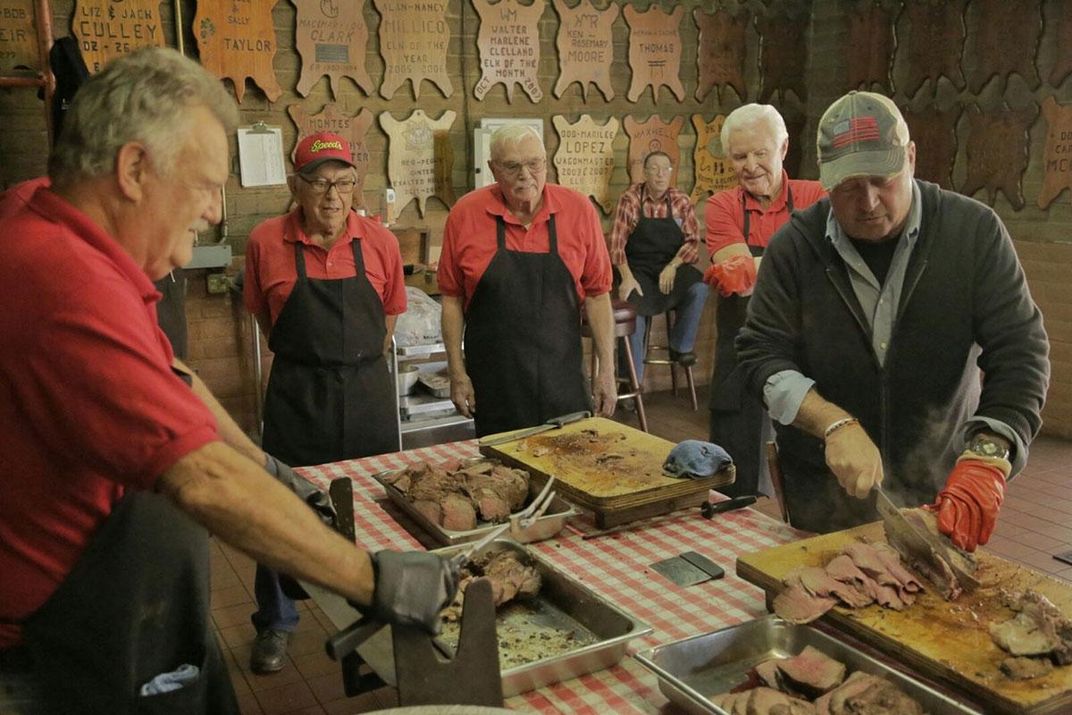Come for the Bug Eating and Get a Lesson in Humanity from Andrew Zimmern
A Q&A with the Travel Channel’s ‘Bizarre Foods’ Chef
:focal(393x113:394x114)/https://tf-cmsv2-smithsonianmag-media.s3.amazonaws.com/filer/1a/7c/1a7c0c8a-fe31-4617-852c-921732de685d/zimmern-southernbbq.jpg)
In the Travel Channel show Bizarre Foods, host Andrew Zimmern travels near and far to experience world culture through food. Zimmern spoke with Angelica Aboulhosn, a staff member of the Smithsonian Center for Folklife and Cultural Heritage recently about his many journeys, the personalities he met along the way and the social role of food in our lives. Here are excerpts from the conversation, edited for length and clarity.
What inspired you to travel the globe in search of intriguing foods?
I love people, and I love food; food and people have been my life. About 14 years ago, I realized that people weren’t talking to each other in the spirit of inclusiveness, and we were all simply arguing about the things that divided us—what we worship, what color our skin is, what language we speak. So I came up with the idea of creating a food show that explored culture with the goal of engendering more patience, tolerance and understanding in the world. The hook was the bizarre food angle. It’s the Trojan horse—come for the bug eating and get a lesson in humanity.
Tell us about one person you met over the course of your travels who has always stuck with you.
Many years ago we went to Madagascar, and I met a fisherman who had almost no possessions except for a rickety boat held together with foraged supplies and tree sap. He lived in a house with many children and his wife; it blew away four times a year in storms. He fished every day and used a small rusted piece of metal as a knife to cut bait. He salted his fish, staying out for a few days at a time in horrifically large seas until his dugout sailboat was full. He took his fish to market and traded for other supplies.
I asked him one day if he was happy. His life seemed hard and unrelenting with seemingly no improvement on the horizon. He laughed at me and said, “I have everything a man could ask for: my family and my boat.” And he walked away. I think about him every day of my life.
What’s one dish you discovered on your show that you cannot live without?
A Sichuan hot pot. I had eaten it for years but until I traveled to Chengdu, I hadn’t fully experienced it. That visit reminded me that the act of traveling to a place to experience a cultural totem or in situ is so much more valuable than experiencing it elsewhere. From the communal cauldrons boiling with chilies and garlic to the rich flavors served on colored skewers and topped with dipping sauces, it was sensory overload in the best possible sense and was quite simply unforgettable.

What surprised you over the course of your journey?
Every country on earth has wrapped foods and other transportable edibles cooked in their “containers.” It’s a natural design harkening back to our days as hunters and gatherers. Sitting with community members on the Pilchi River in the Ecuadorean Amazon and eating fish cooked in banana leaf, then experiencing the same dish in a Hanoi street market—nothing is reinvented. All food is connected, and our world is smaller than everyone thinks.
What is one line that someone told you on one of your adventures that made you laugh?
Every show, over a bowl of something particularly odd, at some point someone leans into my ear and whispers, “It’s good for the man.”
If you could travel anywhere in the world, where would you go?
I would want to be on Georgica Beach in East Hampton, Long Island, in 1967 when the world felt safest for me. Ever since then I’ve been chasing my tail.
Where do you go to stay inspired?
Anywhere people are gathered to eat. Amazing things happen when you are in one of those places, and you never know when it is happening, and what will be coming.
Angelica Aboulhosn is a staff member at the Center for Folklife and Cultural Heritage. This interview was originally published at the Folkways website.